‘True to its doctrine’: Conservatives plan for a new church after United Methodism splits over homosexuality debate
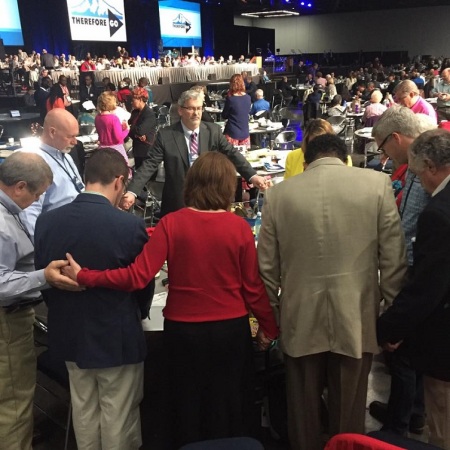
The United Methodist Church, the third-largest Christian sect in the United States, took another step toward schism over their longstanding debate on LGBT issues when theological conservatives recently unveiled their plan for a new denomination.
Known as the Global Methodist Church, it was the product of the 17-member Transitional Leadership Council, a group of theologically conservative United Methodists.
The Wesleyan Covenant Association, a conservative United Methodist advocacy group, announced the launching of the GMC on March 1, explaining that it will not officially begin operations until a formal separation policy is approved by the UMC.
“Theologically conservative United Methodists have made no secret of their efforts to form a new church,” stated the WCA in the announcement.
“In late 2018, the Wesleyan Covenant Association created a Next Steps Working Group to begin drafting its own ‘Book of Doctrines and Discipline’ outlining essential theological confessions and governing structures for a new church’s consideration.”
The creators of the GMC and other United Methodists are holding off further action until the results of the next churchwide legislative meeting, known as the General Conference.
Due largely to the coronavirus pandemic, the global denomination has had to postpone the legislative meeting multiple times, with it presently being scheduled to take place Aug. 29 – Sept. 6, 2022, in Minneapolis, Minnesota.
On the agenda for General Conference 2022 will be a proposal to fund and create at least one new separate denomination for those who no longer want to remain in the UMC.
The Christian Post reached out to United Methodists supportive of or tied to the Global Methodist Church to find out how the proposed new denomination will operate, what opposition exists, and if the new denomination will abort its launch if General Conference fails to approve a separation measure.
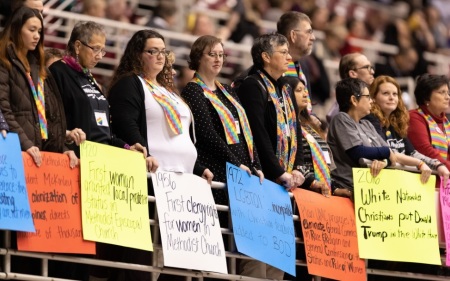
The endless debate
For decades, the UMC has debated whether to change their official stance, as outlined in the Book of Discipline, that labels homosexuality a sin, bars the ordination of noncelibate homosexuals, and prohibits the blessing of same-sex marriages.
These efforts to amend the Book of Discipline have regularly been brought up at General Conference, the churchwide legislative meeting that normally occurs every four years.
Every attempt to change the UMC's stance at General Conference has failed, largely because of delegates from Africa and elsewhere abroad who tend to be more conservative.
In February 2019, at a special session of General Conference held specifically to address the issue, delegates voted to reaffirm the traditional stance, rejecting a proposal known as the “One Church Plan” that would have allowed regional bodies and local congregations to determine their own position on LGBT issues.
Despite the many losses, progressive United Methodists have continued to campaign against the official stance, sometimes engaging in outright defiance of the rules by ordaining openly gay clergy or officiating same-sex marriages.
For example, in 2016, the UMC Western Jurisdiction unanimously elected Karen Oliveto to be bishop of the UMC Mountain Sky Area, making her the first openly gay bishop in the Church.
Although the United Methodist Judicial Council, which is the denomination’s highest court, ruled in 2017 that her election violated church law, she remains in office as of April of this year.
Keith Boyette, president of the Wesleyan Covenant Association and spokesman for the Global Methodist Church, told The Christian Post that UMC leadership has shown “an unwillingness to uphold its teachings.”
“In the United States, particularly, some bishops, clergy, and churches are operating in open defiance to the teachings of the United Methodist Church,” Boyette said.
“The Church has become ungovernable as a consequence, such unchecked defiance has destroyed the integrity of the Church.”
Boyette said that “this defiance” has “only increased in recent years,” noting that “those who advocate for change in the official teachings and who are in defiance have made it very clear that they will not leave the Church voluntarily.”
“With the defiance and disobedience in the leadership of the Church, they can’t be forced to leave,” he continued. “In light of this, theologically conservative leaders have decided to launch a new denomination that will be true to its doctrine and teachings and end this endless conflict within the United Methodist Church.”
John Lomperis of the Institute on Religion & Democracy, who has served as a delegate to the UMC General Conference, told CP that he believed “the cat is out of the bag” when it came to the schism.
“Leaders of all major factions have admitted that we need to split, and a split is coming. The main question is if we are going to split in a relatively amicable way acceptable to all sides, or if we will split in a much more combative and bitter way,” Lomperis said.
“Traditionalist United Methodist leaders have been willing to make great, painful sacrifices for the sake of getting the former. But it remains to be seen if bishops and other liberal leaders will be willing to restrain their own greed and selfishness enough to make the transition smoother.”
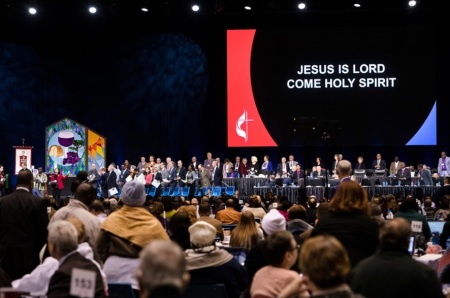
Little dissent among conservatives
In January 2020, a group of theologically diverse United Methodist leaders expressed their support for what they called “Protocol of Reconciliation and Grace through Separation.”
If passed, the Protocol would, among other things, allocate $25 million for conservative Methodists to create a new denomination, tentatively called "traditionalist Methodist."
By March 2020, three regional conferences had voted to send the Protocol to General Conference for consideration, with two expressing overt support for the measure.
Boyette told CP that the “Global Methodist Church is the traditionalist Methodist denomination referenced in the Protocol” and that he was “not aware of any other theologically conservative groups or denominations being planned to emerge from the United Methodist Church.”
The Rev. Thomas Lambrecht, vice president and general manager of Good News magazine, who supports the creation of the GMC, told CP that there was little opposition among conservative United Methodists.
Echoing Boyette, Lambrecht reported that he knew “of no other group that is organizing as a traditionalist alternative to the Global Methodist Church.”
“There are always a few disgruntled people for whom the GMC is not the perfect answer, but I know of no organizational work going on to form an alternative,” Lambrecht said.
“The people who are disgruntled are not prominent, but rather ordinary pastors and laity who leave comments on Facebook or Twitter bashing this or that provision of the new proposed church.”
Given that the General Conference and the likely approval of separation has been postponed until 2022, debates over the GMC’s exact structure will likely come later, Lambrecht said.
“The polity has only been public for a few weeks, so some of that may come in the future,” he told CP in an earlier interview in March. “Now that General Conference has been put off, there may be plenty of time for critique.”
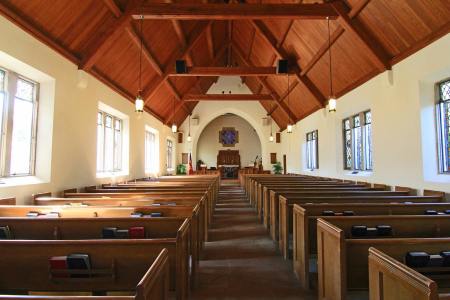
A preliminary structure
Although not officially launched, the Global Methodist Church already has a website that includes a mission statement and information on their plans pending General Conference.
The new denomination, should it formally begin operations, will allow for female ordination and be committed to racial equality, as well as have measures to prevent theological liberals from taking over their leadership.
According to Boyette, as an example, this includes measures laid out in their “transitional book of doctrines and discipline” regarding leadership structure and the ordination process.
“The ordination process is structured so as to ensure allegiance to that doctrinal position, those disciplines, the accountability structures within the Church are robust at every level,” he told CP.
“In the Global Methodist Church, bishops are accountable not to each other but to a global commission on episcopacies, which is composed of laity and clergy who would have been elected to that position because of their allegiance to the doctrines and teachings of the Church.”
The GMC also has a process comparable to that of the Southern Baptist Convention, in which a congregation found in violation of their positions can be removed from the denomination.
“There is a provision in the for the involuntary disaffiliation of a congregation if it fails to adhere to the doctrines and teachings and ethical practices of the Global Methodist Church,” Boyette explained.
“There’s a whole process that is outlined to try to bring the congregation in alignment. But if it persists in their disobedience to the doctrines, discipline, ethics of the Church that would be the ultimate remedy.”
Lambrecht of Good News magazine has heard his share of critique about the plans for the GMC structure and said to CP that he believed the “most common criticism has been that churches should be able to pick their own pastor, more of a call system, rather than having the bishop appoint the pastor.”
“More congregational veto power was considered in earlier drafts of the polity, but we reconsidered in light of the need to ensure that women and ethnic clergy would have an equal opportunity to serve in pastoral ministry in any church,” he continued.
“That issue of pastoral appointment will undoubtedly become a matter of discussion in the first inaugural General Conference of the new church.”
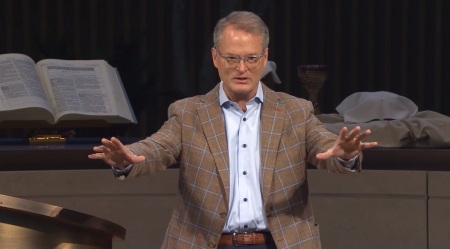
How many will leave?
Adam Hamilton, a United Methodist megachurch pastor known for his support of changing the Book of Discipline's stance on LGBT issues, said in 2019 that he expected as many as 7,500 congregations would leave the denomination due to the debate.
Hamilton made this prediction at the Leadership Institute gathering held September 2019 at his Kansas-based Church of the Resurrection, when the General Conference was still scheduled to take place in May 2020.
“A year from now, we will not be the same church that we are today,” said Hamilton, who went on to predict that there would be “between 3,400 and 7,500 less churches” in the UMC as a result.
Hamilton reasoned that between 3,400 and 6,800 congregations will exit the UMC to join a new theologically conservative denomination while 300 to 1,000 churches will decide that the UMC is still not inclusive enough.
“So we’ll lose 3,400 to 6,800 on one side and maybe 300 to 1,000 churches on the other side,” said Hamilton in 2019, adding that this estimate was “just a guess.”
Conservatives within the UMC who are sympathetic to the creation of the Global Methodist Church were hesitant to provide specific numbers or names of congregations open to joining the new denomination.
“Because the Protocol has not been adopted by the General Conference of The United Methodist Church, local churches cannot make a decision on alignment yet,” Boyette explained.
“We have not asked churches to provide any indication of their plans to affiliate. Until that becomes possible, they’re not in a place to be making decisions.”
While Boyette said that they were “not able to say how many of the local churches are planning to join the Global Methodist Church when it comes into existence,” he did note that a lot of churches had expressed an interest.
Lomperis of the Institute on Religion & Democracy, whose organization has many connections to conservative United Methodism, also declined to name specific congregations that would likely join the GMC once a separation proposal was approved.
He told CP that it would be “unwise to get into listing all the particular congregations likely to join the GMC” due to possible “vindictive” acts from some left-leaning UMC officials.
“This could paint a giant target on such congregations and pastors, making them vulnerable to all kinds of repercussions,” he said.
“Even if we get the Protocol passed, it will remain to be seen if bishops and others will have integrity in fairly implementing the Protocol’s terms, to let congregations and conferences make their own fair, free, and informed choices.”
Should the Protocol separation plan be enacted, Lomperis believed that “we could expect a large critical mass of Americans joining the GMC, joined by others in Europe, especially Eastern Europe, the Philippines and Africa.”
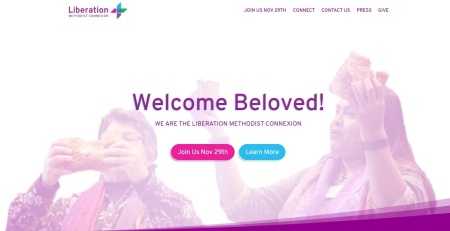
Liberation Methodism
Conservative churches are not the only ones considering a departure from the UMC, as some progressives have formed their own splinter church organization.
Known as the Liberation Methodist Connexion, its creation was announced last December, with the group describing themselves as “a grassroots denomination of former, current, and non-Methodist faith leaders working on the unfolding of the kin-dom of God.”
“We intentionally invite the full participation of all who are living out their God-given identities and expressions,” stated the website. “We are journeying toward a new way of being followers of Christ that refute the imbalance of powers, principalities, and privileges that has plagued Methodism: colonialism, white supremacy, economic injustices, patriarchy, sexism, clericalism, ableism, ageism, transphobia, and heteronormativity.”
In response to the development, Mark Tooley, president of the Institute on Religion & Democracy, wrote a blog post predicting that the progressive denomination would not become a major entity.
“LMX will live out theological pluralism to its more logical conclusions, minimizing if not altogether dismissing theological doctrine in favor of political activisms and identity politics,” wrote Tooley last year.
“No doubt LMX will start very small and will remain a small niche movement. Most radicals will stay within United Methodism, or whatever it is ultimately called, shifting what’s left of the old denominational structures ever leftward.”
CP reached out to the Liberation Methodist Connexion for this story. While a representative said they would respond, a response was not provided by press time.
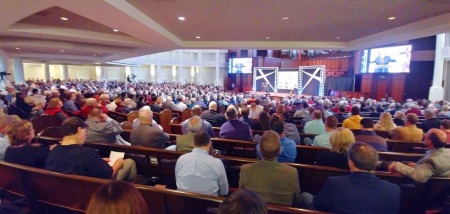
Leaving Regardless?
Although the Global Methodist Church lacks any conservative splinter competition and many leaders have signed on to the Protocol, its passage is not inevitable.
In September 2019, before the Protocol separation plan was announced, the Africa College of Bishops released a statement denouncing any plans to “dissolve” the United Methodist Church.
“That we do not accept any plan that calls for the dissolution of the church and by default, the closure of General Agencies,” they stated, as reported by United Methodist Insight.
“… we call on the entire denomination to exercise restraint and work towards an approach to the human sexuality debate in ways that are humane and respectful.”
Nevertheless, it was an African bishop, John Yambasu of Sierra Leone, who helped develop the Protocol plan that was announced months after the African bishops’ statement was released.
Boyette told CP that he believed, when it came to possible opposition from African delegates and bishops, “ultimately, it is the rank and file clergy and laity who will make the decision on what they will do.”
“Those bishops from Africa who urged continued alignment with The United Methodist Church have not addressed how remaining aligned will solve the irreconcilable differences present in the Church,” said Boyette.
When asked by CP what the GMC will do if the Protocol fails to pass at General Conference 2022, Boyette responded that there was still a chance that many congregations would leave regardless.
“Those who are supportive of it and are theologically aligned with the Global Methodist Church have made it very clear from the inception that we cannot be part of the United Methodist Church if it changes its teachings or continues to be ungovernable,” he explained.
“Should the Protocol not be adopted and the United Methodist Church either changes its teachings or fails to resolve its lack of coherence, we anticipate that the Global Methodist Church will be launched.”






















